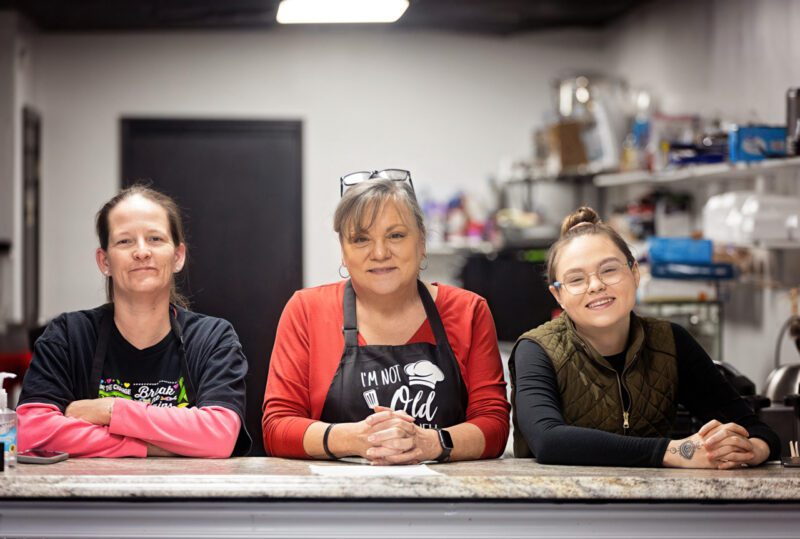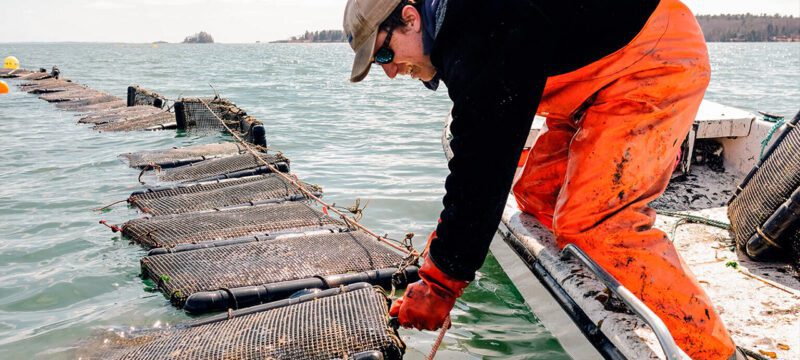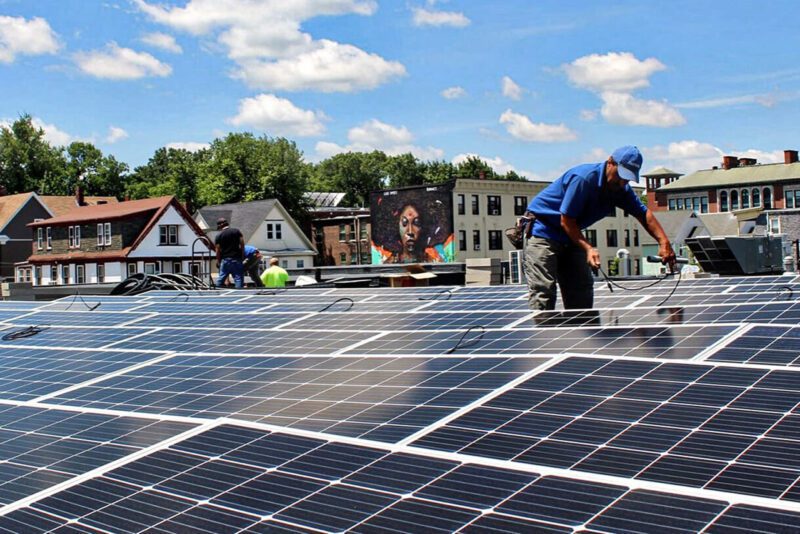From Survival Mode to Thriving
Rewiring (or unlocking) the MENA business mindset
Investing in environmental resilience for low-income communities

Image Courtesy of Hemphill Community Center
In recent years, the climate conversation has largely focused on reducing greenhouse gas emissions — a critical and necessary step in mitigating harm. However, for many communities and industries, the impacts of climate change are already disrupting livelihoods and threatening safety. This reality underscores the urgent need to invest in environmental resilience.
In rural Letcher County, Kentucky, the Hemphill Community Center offers a compelling example of grassroots resiliency. Housed in the former Hemphill Grade School, the center functions as a vital gathering space, home to the Letcher County Coal Miner’s Monument, and incubator for two small businesses: Hemphill Catering Company and Black Sheep Brick Oven & Bakery — a second-chance employment program supporting individuals in addiction recovery.
Beyond its day-to-day functions, Hemphill has become a vital resource during environmental disasters. During the historic floods of 2022 that devastated nearby Neon, the center served as a regional hub for relief and recovery. Years later, as the community continues to rebuild from that disaster and subsequent flooding in 2025, residents still rely on Hemphill for essentials such as Wi-Fi, showers, and laundry.

Image Courtesy of Mountain Association
But without significant investment in energy-efficiency projects, Hemphill would not have been able to play this vital role. In 2018, the center’s electricity bills regularly exceeded $2,000 per month — jeopardizing its ability to stay open. With technical support from Mountain Association, a local Community Development Financial Institution (CDFI), the center began taking simple steps, such as replacing indoor and outdoor lighting with efficient LEDs, resulting in meaningful energy savings. Mountain Association also helped finance a solar installation in 2019. In 2025, additional panels and battery storage were added, creating a self-contained system that allows the center to keep its critical services running even during power outages and flooding — ensuring continuity and safety for the community.

Image Courtesy of Hemphill Community Center
At Hemphill, the exterior lighting upgrade cost just $450, while the expansion of the solar array and addition of battery storage exceeded $35,000. Whether low-cost or high-cost, projects like these can feel equally out of reach for nonprofits, businesses, and homeowners in low-income communities — due to financial, logistical, or technical barriers.
Helping communities identify and prepare for resiliency projects — paired with access to appropriately scaled capital — has become a core focus of the Kresge Foundation’s environmental resilience strategy.
The Kresge-funded Community Health Access to Resilient Green Energy (CHARGE) program is a partnership among three mission-driven organizations helping Federally Qualified Health Centers (FQHCs) transition to clean, resilient, and affordable energy. Together, the National Association of Community Health Centers (NACHC), Capital Link, and Collective Energy offer education, assessments, design, installation, and financing services that make solar energy adoption feasible. By relieving administrators of time-consuming logistics, CHARGE transforms solar from a long-delayed aspiration into a practical solution — enabling FQHCs to install systems that not only ensure continuity during grid outages but also deliver long-term cost savings.
In natural resource-dependent rural economies like Maine, environmental resilience goes far beyond electricity. The Gulf of Maine is warming faster than 99% of the world’s oceans, disrupting marine habitats and migration patterns — and putting New England’s legacy fisheries, along with the multigenerational businesses that depend on them, at serious risk.

Image Courtesy of CEI
To sustain a resilient local food system and support workers in this culturally vital industry, Coastal Enterprises, Inc. (CEI) — a Maine-based Community Development Financial Institution — has created training programs and financing tools to help marine harvesters diversify their income through aquaculture and sea farming.
In partnership with Maine Sea Grant and other collaborators, CEI has trained over 531 participants through the Aquaculture in Shared Waters program since 2013. It has also developed a tailored Sea Farm Loan to help aquaculturists launch and expand their businesses.
CEI supports innovation throughout the food system, offering technical assistance and financing to processors like Ocean’s Balance, which purchased Maine’s first industrial kelp dryer. Kelp farming has become an important off-season income source for Maine’s lobstermen, and the new dryer — capable of handling up to 30,000 pounds of wet seaweed per day — eliminates a major bottleneck that had been slowing the growth of the state’s seaweed industry.

Image Courtesy of Clean Energy Group
Meanwhile, land-based farmers are grappling with rising electricity costs, prolonged drought, and shifting growing conditions — reflected in the USDA’s 2023 update to plant hardiness zones. Strategic investments in tools like efficient irrigation systems or greenhouses can help farmers better manage these variables. Similarly, installing solar panels on barns or other farm structures can stabilize electricity costs — especially for high-energy users like dairies — without reducing usable farmland.
CDFIs and community-based organizations such as Mountain Association, Coastal Enterprises, and the National Association of Community Health Centers have long histories of partnering with local communities and industry stakeholders to identify needs and deliver accessible financing. This makes them especially well-positioned to drive strategic investments in community-level environmental resilience.
This is a powerful opportunity not only to build more resilient communities — but also more equitable ones. By directing climate resilience investment toward communities of color, rural areas, low-income populations, and our food systems — groups that are disproportionately affected by climate change and have the least access to adaptive resources — we can ensure that resilience is inclusive, sustainable, and just.
Related Content
Comments
Deep Dives

Featuring
Clarisse Awamengwi
IE Correspondent
July 17 - 12:00 PM EST

Featuring
Russell McLeod
July 24 - 12:00 PM EST
RECENT
Editor's Picks
Webinars
News & Events
Subscribe to our newsletter to receive updates about new Magazine content and upcoming webinars, deep dives, and events.
Become a Premium Member to access the full library of webinars and deep dives, exclusive membership portal, member directory, message board, and curated live chats.
At Impact Entrepreneur, we champion fearless, independent journalism and education, spotlighting the inspiring changemakers building the Impact Economy. Diversity, equity, sustainability, and democracy face unprecedented threats from misinformation, powerful interests, and systemic inequities.
We believe a sustainable and equitable future is possible—but we can't achieve it without your help. Our independent voice depends entirely on support from changemakers like you.
Please step up today. Your donation—no matter the size—ensures we continue delivering impactful journalism and education that push boundaries and hold power accountable.
Join us in protecting what truly matters. It only takes a minute to make a real difference.
0 Comments